
Comprehensive Guide to Women, Mother & Child Health: Essential Tips for Every Stage
📑 Contents
Comprehensive Guide to Women, Mother & Child Health: Essential Tips for Every Stage
Women, mother, and child health form the cornerstone of vibrant communities and healthy futures. From adolescence through motherhood and early childhood, each stage presents unique challenges and opportunities. Understanding and supporting health at every step is vital—not just for individuals, but for families and society as a whole. This guide delivers practical, evidence-based advice to help women, mothers, and children thrive.
Understanding Women’s Health Across the Lifespan

Women's health encompasses physical, mental, and social well-being throughout life’s stages. From puberty and reproductive years to menopause and beyond, each phase brings specific health needs. Regular check-ups, screenings, and a focus on preventive care can significantly improve quality of life and reduce disease risk.
Key Areas of Women’s Health
- Reproductive Health: Includes menstrual health, fertility, contraception, and safe pregnancy planning.
- Hormonal Health: Managing changes during puberty, pregnancy, and menopause.
- Mental Health: Addressing stress, anxiety, and depression, which can be more prevalent due to hormonal fluctuations and life transitions.
- Chronic Disease Prevention: Screening for breast, cervical, and ovarian cancers, as well as managing heart health and osteoporosis risk.
Maternal Health: Pregnancy to Postpartum

Maternal health is a critical component of overall family well-being. Proper care before, during, and after pregnancy ensures the best outcomes for both mothers and babies.
Essential Maternal Health Practices
- Prenatal Care: Regular medical check-ups, ultrasounds, and blood tests to monitor mother and baby’s health.
- Nutrition: A balanced diet rich in folic acid, iron, calcium, and other essential nutrients.
- Physical Activity: Safe exercise routines to support healthy weight gain and reduce pregnancy complications.
- Mental Wellness: Recognizing and managing prenatal and postpartum depression and anxiety.
- Postpartum Care: Monitoring recovery, breastfeeding support, and family planning guidance.
Child Health: From Infancy to Early Childhood

Early childhood is a period of rapid growth and development. Proper nutrition, vaccination, and regular health checks lay the foundation for lifelong health.
Key Child Health Milestones
- Newborn Care: Immediate postnatal care, breastfeeding, and monitoring for jaundice or infections.
- Immunizations: Following the recommended vaccination schedule to protect against preventable diseases.
- Growth Monitoring: Tracking height, weight, and developmental milestones.
- Nutrition: Introducing age-appropriate foods and addressing picky eating or allergies.
- Safety: Creating a safe home environment to prevent injuries.
Nutrition for Women, Mothers & Children
Nutrition plays a pivotal role in maintaining health at every stage. Women’s nutritional needs shift through life, while mothers and children require targeted support for growth and recovery. Below is a table outlining recommended daily nutrient intakes for women, pregnant/lactating mothers, and children.
| Nutrient | Women (19-50 yrs) | Pregnant/Lactating Mothers | Children (1-3 yrs) |
|---|---|---|---|
| Calories | 1,800–2,400 kcal | 2,200–2,800 kcal | 1,000–1,300 kcal |
| Protein | 46 g | 71 g | 13 g |
| Iron | 18 mg | 27 mg | 7 mg |
| Calcium | 1,000 mg | 1,000–1,300 mg | 700 mg |
| Folic Acid | 400 mcg | 600 mcg | 150 mcg |
| Vitamin D | 600 IU | 600 IU | 600 IU |
Source: U.S. Dietary Guidelines and WHO recommendations (2024)
Preventive Health Strategies
Prevention is better than cure—especially for women, mothers, and children. Adopting healthy habits, routine screenings, and vaccinations can prevent many common illnesses.
Top Preventive Measures
- Regular Medical Check-ups: Annual physicals, reproductive health screenings, and pediatric visits.
- Vaccinations: For mothers (e.g., flu, Tdap during pregnancy) and children according to national schedules.
- Healthy Lifestyle: Balanced diet, regular exercise, adequate sleep, and stress management.
- Oral Health: Dental check-ups for women and children to prevent cavities and gum disease.
- Sexual Health: Safe practices and STI screenings for sexually active women.
Mental Health and Emotional Well-being
Mental health is as important as physical health, especially for mothers and children. Hormonal changes, sleep deprivation, and life transitions can contribute to anxiety, depression, and emotional stress.
Supporting Mental Health
- Open Communication: Encouraging conversations about feelings and mental health in families.
- Professional Support: Seeking help from counselors or therapists when needed.
- Community Resources: Leveraging support groups, parenting classes, and local health initiatives.
- Mindfulness Practices: Activities such as yoga, meditation, and relaxation techniques for stress relief.
Empowering Women and Families Through Health Education
Education is a powerful tool for improving health outcomes. Women and families who are informed about health risks, preventive practices, and available resources are better equipped to make healthy choices.
How to Access Reliable Health Information
- Consult Healthcare Professionals: Doctors, nurses, and midwives provide tailored, evidence-based advice.
- Use Trusted Online Resources: WHO, CDC, and national health services offer up-to-date, reliable guidance.
- Participate in Community Programs: Local clinics and non-profits often offer educational workshops and materials.
Frequently Asked Questions (FAQs)
1. What are the most important prenatal vitamins for pregnant women?
Folic acid, iron, calcium, and vitamin D are crucial prenatal vitamins. Folic acid helps prevent neural tube defects, while iron supports increased blood volume and prevents anemia.
2. How often should children have health check-ups?
Infants and toddlers should have regular check-ups at 1, 2, 4, 6, 9, 12, 15, 18, and 24 months, then annually after age 2, unless otherwise advised by a healthcare provider.
3. What are the early signs of postpartum depression?
Signs include persistent sadness, loss of interest in activities, changes in appetite, sleep problems, feelings of guilt, and difficulty bonding with the baby. Seek professional help if these symptoms occur.
4. How can mothers ensure their children are getting proper nutrition?
Provide a balanced diet with fruits, vegetables, whole grains, lean proteins, and healthy fats. Limit sugary snacks and drinks, and consult a pediatrician for advice on supplements if needed.
5. Are there specific vaccines recommended for women during pregnancy?
Yes. The flu vaccine and Tdap (tetanus, diphtheria, and pertussis) vaccine are recommended during pregnancy to protect both mother and baby.
Summary: Building a Foundation for Lifelong Health
Women, mother, and child health are deeply interconnected and essential for the well-being of families and communities. By prioritizing preventive care, proper nutrition, mental wellness, and health education, women and families can navigate each life stage with confidence. Remember, regular check-ups and open communication with healthcare providers are key to addressing unique needs and ensuring a healthy future for all.











